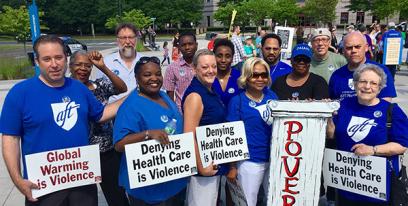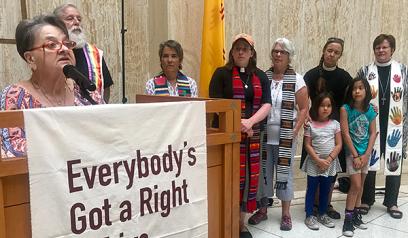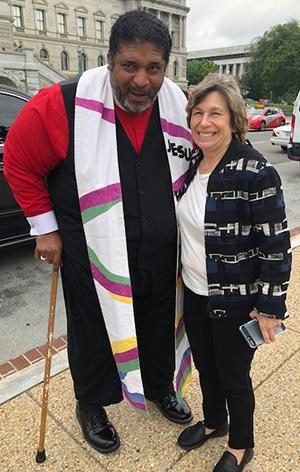The AFT is all in for the Poor People’s Campaign, a six-week action of nonviolent demonstration that revives Martin Luther King Jr.’s original Poor People’s Campaign, launched just before his death in 1968. The renewed campaign is broader, and drills down to address the symptoms of poverty, including many that affect AFT members every day: poorly funded public schools for low-income communities, inequitable access to healthcare and other services, environmental devastation that hits poor communities harder than others, and more.
Each week, campaign rallies in dozens of cities across the country focus on a different aspect of the problem, from people with disabilities living in poverty, systemic racism and poverty, and the war economy and gun violence, to ecological devastation, inadequate healthcare and the deterioration of basic morality. Most recently, beginning June 11, the campaign addressed education, living wages, jobs, income and housing—and AFT members and leaders came out in force.
In Pennsylvania, the president and the vice president of the Pittsburgh Federation of Teachers were arrested during protests at the state Capitol. “Making sure that every child has access to a quality education and that every worker has the right to unionize are issues that are worth getting arrested for,” said PFT President Nina Esposito-Visgitis. “Our membership stands shoulder to shoulder with the Poor People’s Campaign to raise people up by investing in our public schools and increasing the minimum wage.”
In Connecticut, several AFT members were arrested during the first action, including AFT Connecticut President Jan Hochadel—and they were out again for demonstrations each following Monday. “This campaign may have been inspired by historic events 50 years ago,” said Hochadel, who previously taught in the state’s technical high schools. “Yet, in 2018, we’re witnessing the lessons of nonviolent, civil disobedience across the country, from West Virginia to Arizona and Oklahoma to Puerto Rico. Union members are putting themselves on the line—and winning. They’re winning not just for themselves — they’re winning justice for their students, their patients, the residents they serve and their communities.”
Some members of the Ohio Federation of Teachers drove hours to participate in demonstrations in Columbus, where they spoke about the impact of education, wage and health policies on poor and working-class families, and demanded full and equitable funding for public schools. Educators also gathered in Chicago, where they joined the Grassroots Education Movement, an alliance of parent, community and teacher organizations and unions, to call for elected representative school board hearings and rent control legislation during their march to Chicago Public Schools headquarters.
In Jackson, Miss., students joined members of the Jackson Federation of Teachers calling for better funding for public schools along with fully funded anti-poverty programs and union rights.
Framing unions as essential to worker rights and living wages, AFT New Mexico Executive Vice President Kathy Chavez (pictured below) addressed a Santa Fe teach-in saying, “We must educate the younger generations of citizens that unionized, working people have accrued so many rights for all Americans.” To the other community groups attending the event, including people from the faith community, LGBTQ advocates and healthcare and housing activists, she added, “As a lifelong unionist, perhaps it is fitting that it is the working class—the working poor—who are once again stepping up and leading this charge alongside you.”
These sorts of broad coalitions have been a hallmark of the Poor People’s Campaign and perhaps one of its greatest strengths. “Issues of pay, education, respect and safeguarding the rights of workers are intersectional, which is why the AFT wholeheartedly supports the Poor People’s Campaign,” said Chavez, who is also an AFT vice president.
AFT President Randi Weingarten describes the essence of the effort: “Fifty years since the launch of the Poor People’s Campaign by the Rev. Martin Luther King Jr., 43 million Americans remain in the grips of poverty and 140 million Americans are considered low-income,” she writes in an op-ed published at the beginning of the campaign. “The number of families living on $2 per person, per day — yes, $2 per day — has grown to 1.5 million American households, including 3 million children.”
But what does that look like on the ground? She goes on: “Think about that: Going years without seeing a dentist. Going to school in dirty clothes. Cleaning soiled diapers in order to reuse them. Selling plasma to buy food. Never having enough food.”
She describes the “terrible circumstances” of the poor—“unsafe sewage and sanitary conditions, chronic homelessness, criminalization and harassment just for being poor.” Quoting a United Nations report, she adds, “the persistence of extreme poverty is a political choice made by those in power,” and that “with political will, it could be readily eliminated.”
That is a large part of what the Poor People’s Campaign is designed to do: to create the political will to fix this. “AFT members address the plight of poverty every day in their work in hospitals and schools, and we are proud to be a coalition partner in the new Poor People’s Campaign,” Weingarten says. “In this age of unprecedented bounty, it is time to end the oppression of the poor and embrace a moral revival. That would make America great.”
[Virginia Myers and AFT staff]



